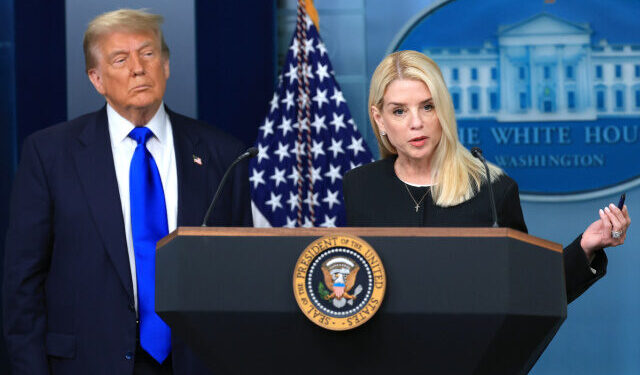President Donald Trump is standing firmly behind Attorney General Pam Bondi as controversy swirls over how federal agencies have handled the explosive case files of convicted sex offender Jeffrey Epstein. Speaking to reporters Tuesday, Trump praised Bondi’s handling of the materials as “very well done,” while taking aim at the usual cast of deep-state suspects who’ve long worked to bury inconvenient truths.
Trump said Bondi gave him a “very quick briefing” on the recently released DOJ and FBI memo regarding Epstein, but didn’t mince words about its credibility. “These files were made up by Comey,” Trump said. “They were made up by Obama, they were made up by the Biden… and we went through years of that, with the Russia, Russia, Russia Hoax.”
Trump’s remarks come in the wake of a controversial memo released by the DOJ and FBI, which claimed that Epstein had no client list and that his 2019 prison death was officially ruled a suicide. The implication? Nothing more to see here. But that conclusion—conveniently tidy for those in power—has only added fuel to long-simmering suspicions among Americans about who’s truly being protected.
Pam Bondi, who has been tasked with reviewing classified case files—including those tied to Epstein—has emphasized transparency, while walking a tightrope around national security and legal constraints. “Whatever she thinks is credible, she should release,” Trump said, granting Bondi wide latitude to act as she sees fit.
When asked during a cabinet meeting about the missing minute from the prison surveillance tape on the night Epstein died, Bondi reiterated that the footage, while inconclusive on its own, was paired with additional evidence supporting the suicide determination.
However, Bondi didn’t downplay the disturbing nature of what’s in the files. Referring to a February appearance on Fox News that stirred online speculation, she clarified: “I was asked a question about the client list and my response was, ‘It’s sitting on my desk to be reviewed,’ meaning the file, along with the JFK, MLK files as well.” She added that “tens of thousands of video” files tied to Epstein amounted to nothing less than child pornography—material that, by law, “will never be released, never going to see the light of day.”
When reporters pressed Trump about Epstein while Texas was reeling from catastrophic flash flooding, he didn’t hold back. “I mean, I can’t believe you’re asking a question on Epstein at a time like this,” he said. “We’re having some of the greatest success and also tragedy with what happened in Texas. It just seems like a desecration.”
The remark wasn’t just a rebuke—it was a reminder. While the media remains fixated on sensational narratives, the administration continues to prioritize real-world emergencies, national resilience, and serious reform.
Reports have hinted at tension between Bondi and FBI Deputy Director Dan Bongino over the release of Epstein-related materials. Trump, however, made it clear on Truth Social that Bondi retains his full support.
This entire episode underscores the deeper issue: a bureaucratic class that’s long operated in the shadows, seemingly immune from accountability. Bondi’s efforts—and Trump’s backing—signal a different course: one that values transparency, empowers leadership outside the D.C. echo chamber, and refuses to bend to pressure from legacy institutions desperate to protect their own.
As Bondi reviews the Epstein files and other historic records, the message from the Trump administration is clear: sunlight remains the best disinfectant. And this time, the cleanup won’t be swept under the rug.




















